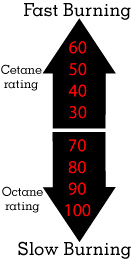Engine Oil
A diesel engine does not use the same lubricating oil as a gasoline engine since the chemistry of acid formation and other corrosive build-up in the oil is different: a diesel is more likey to form deposits at high temperatures rather than at low temperatures like a gasoline engine. Diesel fuel also has a higher sulphur content, making sulphuric acid build-up in the oil more likely. Diesel engine oils are compounded to neutralize the harmful effects of these tendencies.
In 1971, the American Petroleum Institute, the Society of Automotive Engineers, and the American Society for Testing Materials jointly approved a new and simplified system for classifying engine oils. The naturally aspirated diesel engine should use oil labeled with a CC or CD rating. Due to higher thermal loads on turbo-diesel engines, only oil labeled with a “CD” rating should be used.
For diesel engine use API grade “CC” or “CD” For turbo-diesel use API grade “CD”
Engine oil gets thicker as it gets colder, making it harder to crank the engine when starting. Change over to the proper engine oil viscosity when cold weather sets in.
Diesel Fuel
Diesel fuel is obtained from distilled crude oil. The distilling process is a highly complicated one involving precision control of temperatures and pressures. Because of the variability of the refining process, as well as the variability in crude oil sources, the diesel fuel that we find in our customer’s fuel tanks will also vary depending on where the fuel was bought.
At low outside temperatures we begin to be concerned with:
1) Cloud Point (the temperature at which wax forms in diesel fuel)
2) Pour Point (the temperature at which fuel stops flowing).
As the temperature drops wax can sometimes form in the fuel tank, fuel lines, and/or fuel filter. If it does, the fuel supply lines will become plugged and result in running and no start problems.
Another property of diesel fuel essential to diesel engine performance is Cetane Number, a measure of its ignition quality which influences both ease of starting and combustion roughness. A cetane number rating is obtained by comparing the given fuel with cetane (a colorless liquid hydrocarbon that has excellent ignition qualities). Cetane is assigned a rating number of 100 since it burns very fast.
The Diesel should use diesel fuel with at least a 45 cetane rating.
[ezcol_1half]
Diesel fuel’s cetane number is opposite to gasoline’s octane number.
The higher diesel fuels’ cetane number, the better its ignition quality.[/ezcol_1half] [ezcol_1half_end] [/ezcol_1half_end]
[/ezcol_1half_end]
Overcoming Cold Weather Problems With Diesel Fuel
Temperatures below 20° F (-7° C) are critical to wax formation and result in problems with clogging in the fuel tank, fuel strainer, fuel filter and/or fuel lines. The following guidelines will help you solve cold weather problems with Diesel Fuel:
If outside temperature is above 20°F (-7°C):
• Use Diesel Fuel no. 2.
If outside temperature is below 20°F (-7°C):
• Diesel Fuel no. 1, if available, should be used.
• If Diesel Fuel no. 1 is not available ask the fuel station if his Diesel Fuel no. 2 is winterized.
• A fuel flow improver can be added to Diesel Fuel.
The effectiveness of a flow improver varies depending upon the fuel. Fuel flow improvers should be used according to the manufacturer’s instructions.
• If winterized Diesel Fuel no. 2 is not available, Diesel Fuel no. 2 should be mixed with up to 50% kerosine. A 50/50 mixture will reduce engine power slightly.
— at 20° F; use 75% no. 2, to 25% kerosene
— at below 14° F; use 50% no. 2, to 50% kerosene
Only if neither Diesel Fuel no. 1, nor kerosene are available, up to 30% leaded or unleaded regular gasoline can be mixed with Diesel Fuel no. 2.
• Do not use premium gasoline.
• Mixing Diesel Fuel no. 2 with kerosene or gasoline must be done before wax starts to separate.
• Always add the prescribed amount of kerosene or gasoline to the fuel tank first, then fill up with Diesel Fuel.
• Do not use starting assist fluids; they will cause engine damage.
• Do not use fuel line antifreeze intended for gasoline engines.
Safety
• Any amount of gasoline added to Diesel Fuel renders the mixture as flammable as pure gasoline.
• Handle all fuels in a well ventilated area. Do not smoke or have anything flammable near the fuel.
